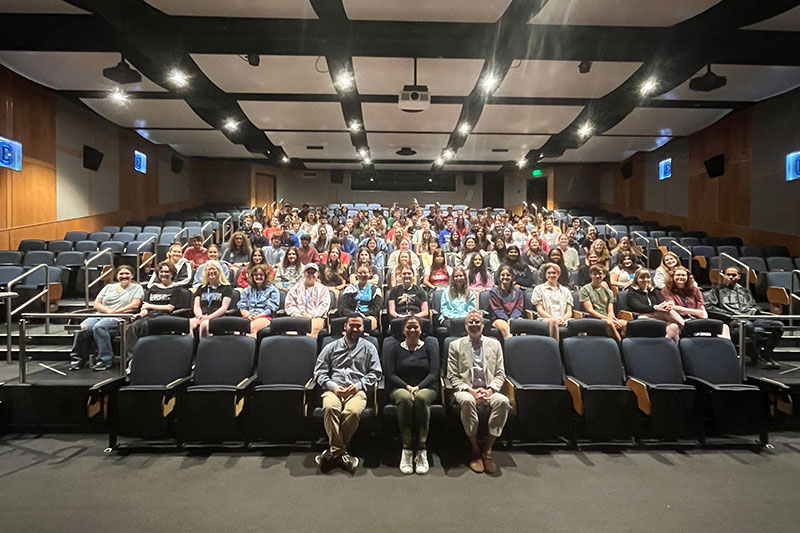
Honors Program
Learn, Serve, and Lead
The Elizabethtown College Honors Program offers a close-knit community of well-rounded individuals from all backgrounds who not only embrace academic excellence and intellectual rigor, but who also have the desire to engage their local, national, and international communities and demonstrate leadership initiative. Our program's motto is Learn, Serve, and Lead!
The Honors Program is supported through an endowed gift from The Hershey Company. We are grateful and honored to have the help of The Hershey Company to ensure our outstanding students experience the program and thrive in the world.
Handbook, Forms & Resources
All Honors Program handbooks, forms, and related resources for students, faculty, and advisors are available on the Honors Program SharePoint site (Etown login required).
Faculty and Student ResourcesWhy Join the Honors Program at Etown?
Honors Program Benefits
The Honors Program is built for students who want depth, access, and momentum. You’ll take smaller, discussion-rich classes, work closely with faculty, and get the infrastructure to actually do the big ideas you care about.
- Small Classes & Mentorship: Real time with professors, not just office-hour check-ins.
- Priority Registration: Build the schedule you want, every semester.
- Honors Academic Grants: Funding for research, creative work, travel, and projects.
- Honors Center: A dedicated space with private study carrels and a built-in peer community.
- Honors Living Learning Community Housing: Live with other Honors students who study, collaborate, and show up.
Signature Experiences
The Honors Program also comes with traditions and professional platforms that make the experience even more unique.
- Honors Outdoor Orientation Trek (HOOT) for Incoming Students: Start with community and confidence.
- Yuletide Festival & Senior Celebration: Bookend moments that define your Etown story.
- Homecoming Gatherings: Reconnect with classmates, mentors, and alumni.
- National Collegiate Honors Council & Northeast Regional Honors Council Conferences: Present, network, and see what honors looks like nationwide.
- Student-Run Honors Council: Social events, such as pumpkin painting, succulent planting, and other events for the Honors students are organized by the student-run Honors Council.
Current students & Alumni Testimonials

Jordyn Dutko '26
“The Honors Program is such a valuable asset to my education here at Elizabethtown College. It has provided me with incredible experiences — particularly the opportunity to work alongside Ambassador John B. Craig on foreign policy projects — that have allowed me to develop my leadership skills, along with apply knowledge from my history and political science majors in meaningful and practical ways. As not only an Honors student, but also a student athlete and Peace and Global Scholar, I believe that the Program gives me the tools to succeed and strive for excellence over the course of my collegiate career and beyond, and I am so grateful to be a part of this extraordinary group of students and faculty!”

John Talbott '22
“I am very grateful to Dr. MacKay for his continued mentorship and dedication, especially in my first few semesters when I was very new to research, as well as Dr. Rozner and his research group. The entire Department of Chemistry and Biochemistry at Etown has and continues to be extremely supportive of all student research projects. I fully believe I would not have been able to achieve these accomplishments at a different university, where I would not have received one-on-one training with professors to develop my skills as a chemist, especially not as a first-year student. The Office of Prestigious Scholarships and Fellows along with the SCARP program are unique aspects of Elizabethtown College that encourage and aid in success.”

William Paterson '21
“I have been fortunate enough to take honors courses while also taking on multiple professional internships with different companies. Throughout my college career, I have maintained a strong network of connections, and the Honors Program is one place where I have been able to build such connections. As a firm believer in the value of acquiring experience early in your college career, I believe the more experience one acquires, the more they understand about the industry they want to go into for a career. They are able to apply the knowledge they get to any future situation. I am so thankful for all the opportunities Elizabethtown College has given me over the years. Everyone has been so supportive in helping my build me career’s foundation.”
Community Engagement and Leadership
In line with Elizabethtown College’s motto of Educate for Service, and the Honors Program’s motto of Learn, Serve, and Lead, Honors students engage in community service, experiential learning, and leadership opportunities. Joining the program means joining a community of peers who excel academically, demonstrate initiative, and are committed to improving their communities.
Honors courses encourage students to demonstrate their academic abilities while fostering leadership, service, and community engagement. Field trips, guest speakers, and collaborative projects ensure students not only learn but also apply their skills in meaningful ways.
The Honors Program Co-Curricular Requirement Hours Log-Sheet can be found through our Canvas page.
This co-curricular requirement in the Honors Program allows students to record and share those experiences. This initiative will help us recognize the meaningful contributions our Honors students actively make to their communities.
Honors students record their 15 hours of volunteer service, community engagement, and leadership each year throughout their undergraduate education. All Honors students submit a diary of those activities as well as a reflection paper on a yearly basis.
Students can use Community-based Learning (CBL) courses, such as HON 201; opportunities through the Center for Community and Civic Engagement at Etown; attendance at the US Foreign Policymaking Leadership Sessions with Ambassador John Craig (and other adjacent sessions/lectures) throughout the academic year; and many more volunteering and/or community engagement and/or leadership opportunities (pre-approved by the Director of the Honors Program).
Benefits of this requirement for students include recognizing and celebrating the significant and impactful service conducted by students; helping students develop inter-group friendships on deeper levels and enhancing their identities as engaged citizens; and providing students a way to purposefully organize and demonstrate their community engagement, volunteer service, and leadership activities, which in turn will help in preparing applications for graduate schools, prestigious scholarships and fellowships, and other career opportunities.
HON 201 Elizabethtown History: Campus and Community-a course offered every spring-draws on NCHC's City as Text TM paradigm to engage students in oral history research, archival research, and historic preservation projects. In previous years, students have conducted National Historic Preservation Act Section 106 reviews of the Elizabethtown Moose Lodge and the North Market Street Bridge.
-
Moose Lodge project: Students conducted a Section 106 review that helped prevent the demolition of the Elizabethtown Moose Lodge, a historic building designed by regional architect Cassius Emlen Urban.
-
Bridge project: Students documented the history of the North Market Street Bridge for PennDOT before its reconstruction, creating an ArcGIS map as part of the process.
-
Marietta project: In a later course, students developed an ArcGIS map showcasing the historical significance of Marietta, Pennsylvania, in support of RiverStewards, a nonprofit dedicated to conserving the Susquehanna River Valley.
Honors Program Staff

Dr. Oya Dursun-Özkanca, Ph.D.
Director of the Honors Program
dursuno@etown.edu |
717-361-4749
facultysites.etown.edu/dursuno
Dr. Oya Dursun-Özkanca (University of Texas at Austin, Ph.D.) is a College Professor of International Studies (Endowed Chair), Professor of Political Science, and Director of the Honors Program and the International Studies Minor at Elizabethtown College, PA.
In Fall 2021, she served as a Visiting Scholar at Harvard University’s Weatherhead Center for International Affairs, working on her next book manuscript on the Eastern Mediterranean regional balance of power. Her research interests include Turkish foreign policy, transatlantic security, European Union, Eastern Mediterranean, South East Europe, and peace operations.
She is the author of two books: Turkey–West Relations: The Politics of Intra-alliance Opposition, published by Cambridge University Press in November 2019, and The Nexus Between Security Sector Reform/Governance and Sustainable Development Goal-16: An Examination of Conceptual Linkages and Policy Recommendations, published as part of the SSR Papers flagship series of the Geneva Centre for Security Sector Governance (DCAF) by Ubiquity Press in May 2021. The Turkish translation of her Turkey–West Relations book, Türkiye–Batı İlişkileri: İttifak İçi Muhalefet Siyaseti, was published by Koç University Press in 2023.
She is also the editor of two books – The European Union as an Actor in Security Sector Reform (Routledge, 2014) and External Interventions in Civil Wars (co-edited with Stefan Wolff, Routledge, 2014) – as well as numerous scholarly articles in peer-reviewed journals, such as International Affairs, Turkish Politics, Foreign Policy Analysis, Civil Wars, European Security, Journal of Intervention and Statebuilding, French Politics, Perspectives on European Politics and Society, and Journal of Balkan and Near Eastern Studies.
She served as a Visiting Fellow of Research on South Eastern Europe (LSEE) at the London School of Economics (LSE) in 2013, and has received grants and fellowships from Georgetown University, the London School of Economics, the European Commission (multiple grants), the American Political Science Association (APSA), the University of Texas at Austin (multiple fellowships), Deutscher Akademischer Austausch Dienst (DAAD), the European Union Studies Association, the Mellon Foundation (multiple grants), and Elizabethtown College (multiple grants).
She is the inaugural recipient of the Kreider Prize for Teaching Excellence at Elizabethtown College (2015); the recipient of the Richard Crocker Outstanding Service to Students Award (2018, 2020); the Ranck Prize for Research Excellence (2022); the Outstanding Honors Professor Award (2025) at Elizabethtown College; and the Honors Professional of the Year Award in the Administrator category (2025) from the Northeast Regional Honors Council.

Jean-Paul Benowitz
Director of Prestigious Scholarships and Public Heritage Studies
benowitzj@etown.edu |
717-361-1110
A historian, Professor Benowitz teaches Honors 201: Elizabethtown History: Campus and Community. This Honors course counts for the Western Cultural Heritage Area of Understanding and Guided Writing and Research requirements for the Core Curriculum. The course also fulfills Community Based Learning, one of the Signature Learning Experience requirements, and is cross-listed with Public Heritage Studies.
Professor Benowitz is Director of Public Heritage Studies; he advises students pursuing the Public Heritage Studies Minor. He has authored books and articles about local history, regional studies, and Elizabethtown College’s history. Based on this scholarship, he teaches Honors 204: The Politics of Historic Preservation in Lancaster County, which counts for Western Cultural Heritage requirements of the Core Curriculum and is cross-listed with Public Heritage Studies. This experiential learning course explores regional studies through the National Collegiate Honors Council (NCHC) pedagogy “City As Text.”
He serves on the NCHC national Place As Text Committee and has given presentations at NCHC conferences and published chapters in monographs about Honors experiential learning and civically engaged research. Professor Benowitz has nationally taught NCHC Place As Text and City As Text Faculty Institutes and Faculty Master Classes.
Professor Benowitz teaches Honors 220: Genealogy, Heraldry, Paleographical Studies, and The Public Historian. This course examines the historiography of biography, autobiography, and memoir through the lens of the historian and the genealogist. It counts for the Humanities Core Area of Understanding, Guided Writing and Research, and the Supervised Research Signature Learning Experience.
He also teaches Honors 205: Honors Leadership Theory and Personal Narrative. This Honors course counts for the Humanities Area of Understanding requirements for the Core Curriculum and prepares students applying for internships, study abroad, jobs, graduate programs, and competitive post-graduate scholarships and fellowships.
Professor Benowitz is Director of Prestigious Scholarships and Fellowships. He has authored articles and chapters in monographs published by the National Collegiate Honors Council (NCHC) about academic advising, teaching, and directing Honors Programs, and serves on the national Program Committee for NCHC.
Much of his scholarship and public presentations have focused on American History, U.S. Presidential History, U.S. Diplomatic History, and Anabaptist and Pietist Studies in a political context. Professor Benowitz has received national recognition for his work in teaching and advising Honors students.

Luke Mackey '17, '18 MPP
Assistant Director of the Honors Program & Program Assistant for Academic Affairs
mackeyl@etown.edu |
717-361-3758
Luke Mackey is a graduate of Elizabethtown College with both his undergraduate and graduate degrees. He provides administrative support for the Honors Program, Office of Prestigious Scholarships & Fellowships, Stamps Scholars Program, and Momentum Program. In addition, he provides advising support for the Honors Program's students.
Luke supervises Honors Course registrations, reviews documents and requests, maintains and updates Honors student records, processes expenditure reimbursements and stipends, supports program communication, marketing, and event planning, oversees the Honors Center, supervises Student Assistants, and coordinates with the Honors Council. Luke also teaches an Honors First-Year Seminar about politics and religion which explores the intersection of these topics and why they are tough, but important, subjects to discuss.
During the 2023-2024 academic year, Luke recieved the David C. Beidleman Exemplar Staff Award in recognition for his outstanding service and commitment to the College and community.
Honors Committee
Dr. Oya Dursun-Özkanca
Chair of the Honors Committee and Director of Honors Program
Luke Mackey
Assistant Director of Honors Program
Julia Ivery '27 & Avonlea Lechleitner '28
Student Honors Council Representatives
Jen Strain
Arts/Humanities/Librarians
Dr. Jean Pretz
Natural/Social Sciences
Dr. Terri Dennehy
Professional Programs


